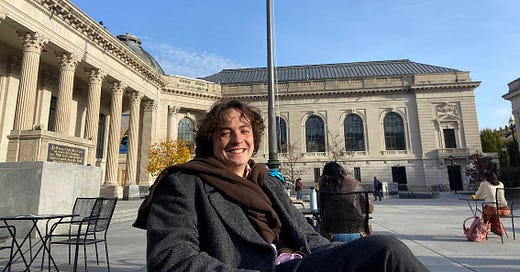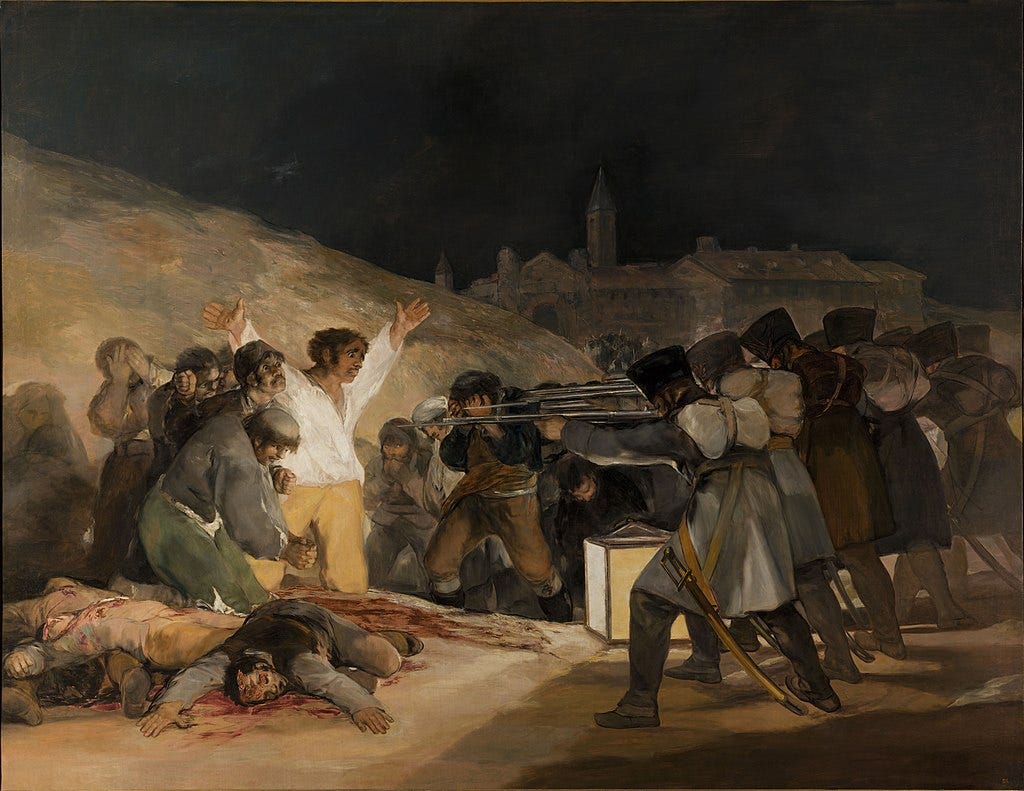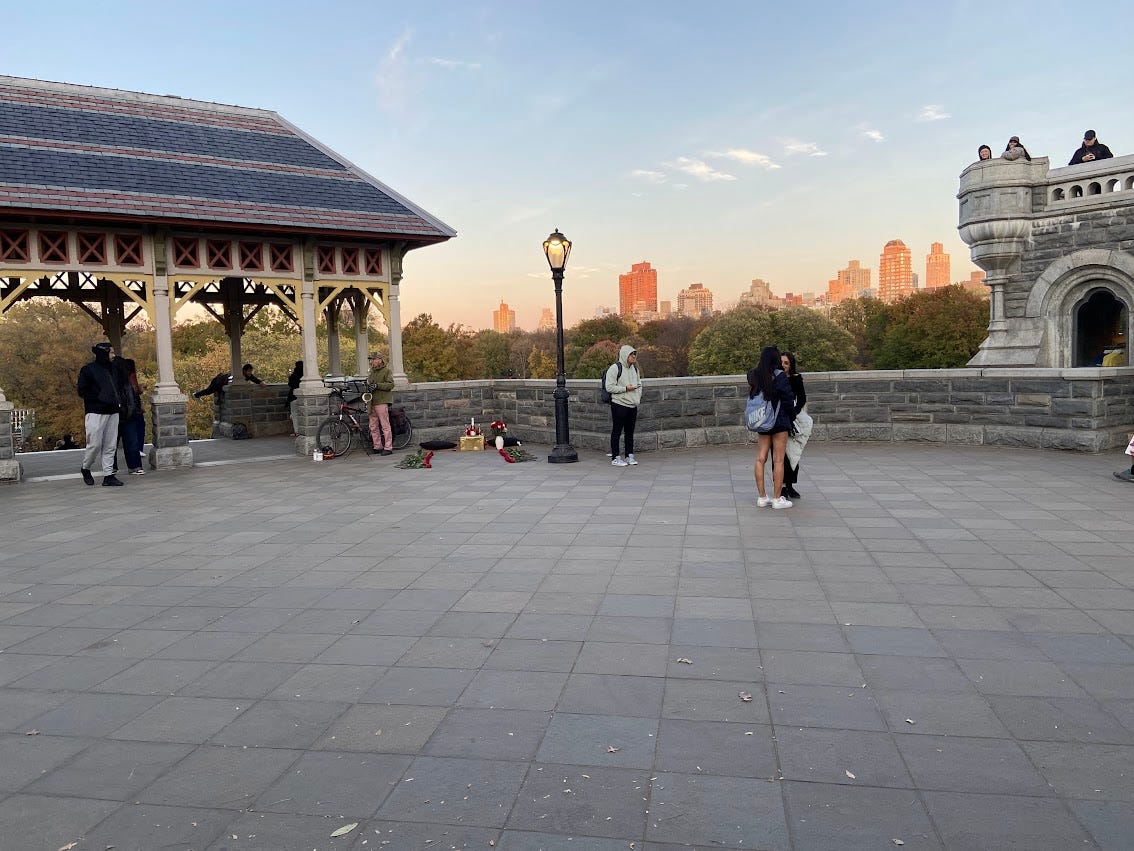So America’s democracy, meant to pool its communities, has selected for leader a man you would not choose for dad, husband, brother, or friend, and we will think of him as much as we might hope to think of our loved ones; if we die at eighty Trump will have been president for a tenth of our days. I spent this week between New York, Yale, and DC, watching the election and reading the novels shortlisted for fiction’s high prize.
“We just don’t see why you’d be so critical about a book if it was listed for a major prize.”
“Because it was listed for a major prize.”
So they told me, and so I told them, as they kicked me from interviewing the International Booker’s winner. How many books will you read in your life? How many will you not read? These prizes should lead you to the stories you will die grateful, desperately grateful, to have found and had in your mind.
Creation Lake by Rachel Kushner
This has been pretty roundly panned so I won’t bang on, but yes it should not be anywhere near the prize. An American mercenary takes a mission to sabotage an eco-commune in rural France. You ask whether a book met its own terms for success, but it’s not clear what virtues this even wanted to have.
Thrills from the plot, voice from the guru, lyricism from the sentences, voice from the narrator, depth from the narrator, anything from the other characters… all abortive, none disciplined. Anyway.
Stone Yard Devotional by Charlotte Wood
After losing both parents a woman visits a convent that “feels somehow like childhood; the hours are so long and there is so much waiting, staring into space. Absolutely nothing is asked of me, nothing expected.” She is a guest observing the nuns until a new guest sees her ‘foreign to ordinary life’ and without planning it she has become a nun and has stayed in the order for years. Outsiders find something “sick about it. Something unnatural about the way you all live here.”
A mice infestation worsens then wanes. They are found in the piano. At first “every snapped trap caused a bodily jolt”. Later she carries the traps out several at once and only remembers to wear a mask and wash her hands when the stench hits her. Birds die from eating the poisoned corpses.
Meanwhile we spend time immersed gracefully in a strange mind, following an inventive and creepy procession of memories: a boy whose mother died in school, a girl who lived miserably with her dad, a hysterical teacher, a confusing teacher, a young girl stabbed to death and canonised, the husband the narrator left, a friend who got terminal cancer, a girl bullied at school. You ask big questions about purpose, life, freedom, responsibility, love, hatred, consciousness, grief, privacy, the self, and most of all about whether to worry and try or give up and pray, living as we do “shivering with self-consciousness, fearing the insinuation we should be something other than we are.”
You do long for some action after chapter 30 but the novel is short. We have spent 237 pages in the weird, atmospheric suspension of our narrator’s personality and are glad we did. Christmas approaches and to our narrator “it seems impossible that I have spent another whole year here, in this place, and yet to leave would be unthinkable… It feels always that I am on the edge of some comprehension here but never breaking through to the other side.”
The Safekeep by Yael van der Wouden
Isabel’s brothers say she has “been alone for too long. You’ve not been around people for too long.” They have left the family house; Isabel has stayed. She is undesired and undesirous – which of those came first is lost to the past. Maladjusted and phobic, she notices and hates every touch, and stays at home polishing her dead mother’s plates. Nothing happens but “She had nothing else in this world. Nothing but these clean floors and neatly made beds.” Until a brother insists she host his girlfriend while he goes abroad. Eva “took up space with a loud restlessness… She touched things, talked about the things she touched, asked questions about them.”
They are opposites and stuck together in an old empty house. It’s not so much one thing leads to another as one thing leads to another… times millions… leads to another. Van der Wouden manages a stuttering, fractional romance, as rewarding as it is difficult. We feel the confused elation of an undersocialised shut-in feeling want, tasting grief, needing friends. After a lifetime without anyone, Isabel cannot bear an hour without Eva. “She thought: I can hold you and find that I still miss your body. She thought: I can listen to you speak and still miss the sound of your voice.”
Then, and I’ve never seen a tone shift like this before, the third section recasts everything that came before as a mystery thriller. Eva was not who we thought! We are reshown the foregoing and directed to all the clues we missed. It’s not nourishing in the most high-minded sense, but it’s fun and does not compromise the prior story. In any case the end resummons the romance in all its splendid complexity.
Held by Anne Michaels
It’s very few pages of Held before you are astonished and remember, after other books on the shortlist, the heights you can hope for literature to reach. You say instantly that this is more like it.
“What we give cannot be taken from us”, we are told, and the book follows the love given at various moments of twentieth-century strife: Yorkshire in 1920, London in 1951, Suffolk in 1984. We follow “the seiches and forces of history that restrict us, shape our assumptions, compassions, freedoms, judgements; the regrets of one generation passed down as hopes for the next, the germs and spores of limitation and expectation we absorb”. Animals like us live off energy that comes to our planet as light, yet the light reaching our planet may come from stars long dead – “Who can say for certain that those who no longer exist, our dead, do not also reach us?”
It’s never plodding, as you fear with intergenerational books. Michaels sustains endlessly fleet evocations and keeps her narration to brief, changing fragments, reflecting “blind chance [as] an argument for destiny”. Sometimes you wish she would stick with these a bit longer and the switch feels too cautious, but this is the best book on the shortlist by some way.
The supernatural was purely the presence of good, the love that burns free of the corpse; always love that tries to escape the human terror.
James by Percival Everett
This retells Mark Twain’s Huckleberry Finn from the perspective off a black character, one of the slaves. It sounds like some lib ass bullshit but is in fact a pretty fun adventure story with rattlesnakes (“cottonmouth!”), getaways, explosions, rivers and killings. It is nicely written, if not memorably so, too.
But it’s distracted by a too-bookish, too-writerly conceit. Any practitioner of ‘language’ should check themselves after using that word. Everett has his slaves exaggerate their diction to reassure the masters: “Who dat dere in da dark lak dat?” and so on. Fair enough. But absent the slavers the slaves talk with literal postgraduate fluency about Mill and Voltaire. Near the end the cliché of the pen’s relative mightiness to the sword is taken ad totally absurdum: cornering a marooned slaver, the eponymous James reveals at once his sophisticated vocabulary and the gun he will kill the man with, and incredibly “it was not the pistol, but my language… that had so disturbed and frightened him.” Was it?!?!
Orbital by Samantha Harvey
One of the great post-work pub lines I’ve heard was about an album “Ladies and Gentlemen We Are Floating in Space. Ugh! Go home and listen to that tonight if you want to improve your life forever!” Orbital tells of astronauts afloat in the ISS, “Six of them in a great H of metal hanging above the earth.” The book follows them through sixteen orbits – twenty-four hours.
Trying to write home, one astronaut finds that “the small things are too mundane and the rest is too astounding”. You are totally cramped but right outside totally open. You can describe having the same packaged breakfast you have every day for nine months, or you can describe the majesty of the cosmos. So Samantha Harvey sets herself an impressive challenge: never to employ the ordinary amplitudes of drama and to keep only to two extreme registers: to give not just the mundane but the ultramundane its beautiful due and to serve as a conductor of cosmic grandeur.
That album might manage it, but such triumphs are rare. Ulysses comes to mind, with two characters pissing in a back garden while overhead “the heaventree of stars hung with humid nightblue fruit.”
A courageous failure, anyway, is always better than a timid acquittal. In the end Orbital is a little short on character, but it’s an interesting picture of a strange existence.
There we are. We knew the president on the 5th of November and we will know the Booker a week later. In a day course on painting I took at City Lit, the tutor said it’s very important that in Goya’s Third of May the history (the firing line) is faceless while the individual (the innocent) have their differing, expressive faces alit. That’s why The Details had to win the International Booker.
It’s also why Held should win on Tuesday. James is the favourite but Held should win. Christian House in the FT is right: “Few authors balance the atrocities of history with the consolations of human relationships quite so effectively.” Here is the most permanent scene from my week in America.
Central Park has a small mock castletop with ramparts and a stone deck. Beyond the deck is a view of the city and this was at a pink sunset. In a corner of the deck was a short corridor of rose petals with, at its end, two cushions beside a small table with two glasses and a bottle of wine. Scanning the deck you found an agitated, hooded man, checking his phone and glancing up the path. He spoke quickly to someone. That person had a bag. Between its zips was what looked like a silver instrument. Someone else approached and asked. The lip reading was easy. “Twenty minutes.”
It is a very flattering light on everyone coming up the path, that in the pink sunset they might be in love and about to propose or be proposed to. And everyone seems likely. The saxophone begins to play classic love songs – quite badly – and now the hooded man’s agitation tells the time. Then he puts his phone away and you check the path and see them. At the petals they shared some words. Lip reading was impossible.
He kneeled, she nods, they hug, and suddenly you’re aware how many other people were waiting and hoping for the same thing. Someone shouts “congratulations!” and cheers explode from the deck and both layers of the ramparts. The friend cries to the crowd “She said yes!” and everyone cheers again.
It’s that sort of thing you hope to have had in mind a lot before you die. I also saw Ed Balls at the Lincoln Memorial, and I know you would rather see my picture of that, but here is the proposal. Is it weird to include? Who cares! Have a great week.
GM







I’ve only read Orbital (love) and The Safekeep (immense dislike, and I feel about it the way you do about Creation Lake, that it should be no where near a prize).